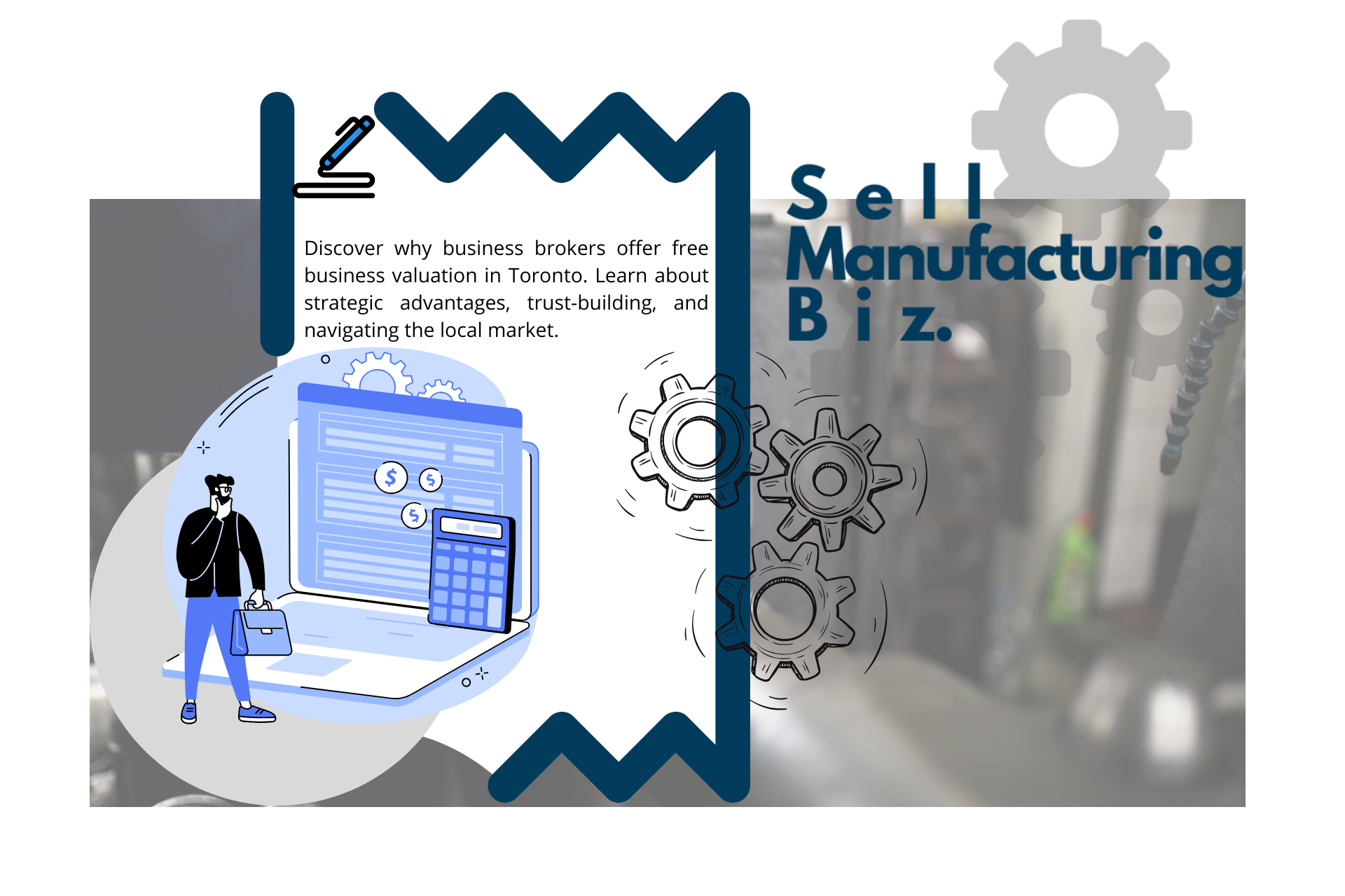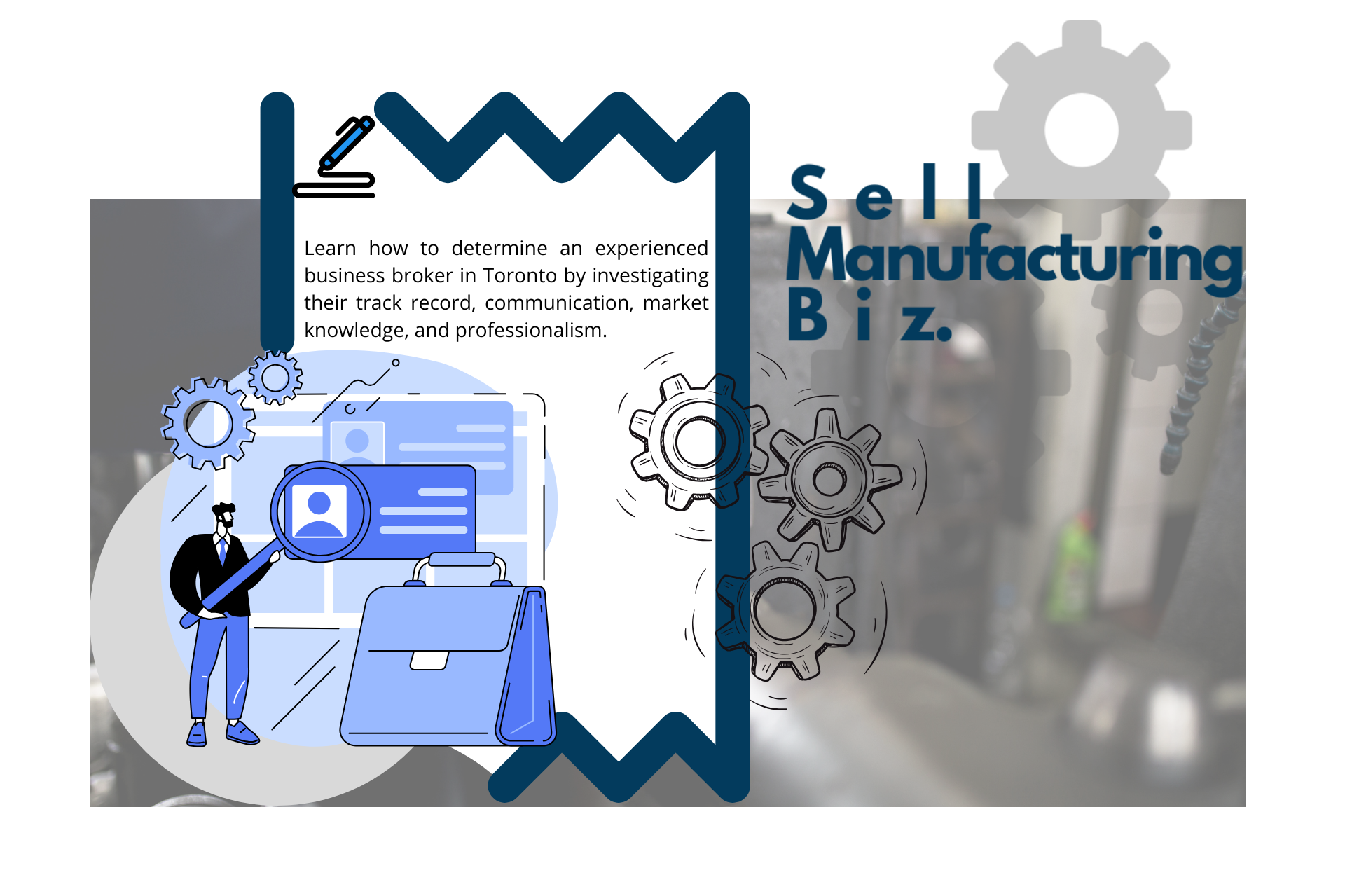The Ultimate Guide: Selling Your Business With A Broker
How to Sell My Business with a Broker
In 7 steps, unlock all your need to know about getting a qualified business broker on your side to help you sell your business in Canada.
- Unlock picking the right broker
- Discover the role of a qualified business broker.
- Get a true business valuation with the help of a broker.
- Prepare your exit and get your docs in ship-shape with the help of a broker.
- Confidentially reach out to qualified buyers when getting a broker on your side.
- Get negotiation done when you hire a business broker with strong negotiation skills.
- Get due diligence done with enlisting the help of a business broker with a track record.
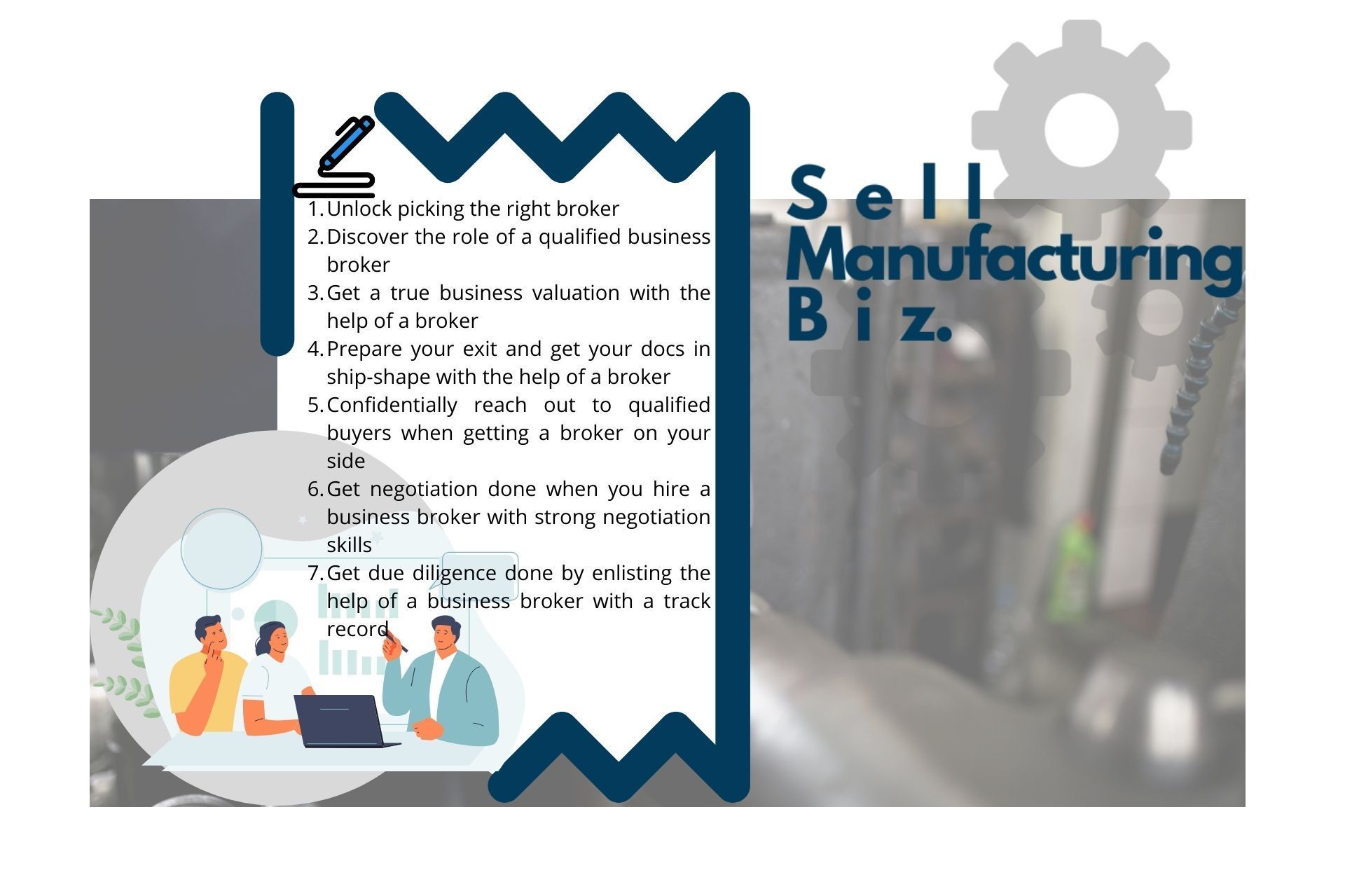
Are you a business owner contemplating selling your business but feeling overwhelmed by the process?
Look no further!
In this ultimate guide, we will explore the ins and outs of selling your business in Canada with the help of a broker. Selling a business in the manufacturing niche is a complex and multifaceted undertaking, requiring careful planning, strategic negotiations, and extensive market knowledge.
That's where a skilled broker like Khaled Baranbo comes in. With their expertise and experience, they can guide you through every step of the journey, from valuation to finding the right buyer and closing the deal.
In this comprehensive guide, we will demystify the intricacies of selling your business and provide you with actionable tips and insights to maximize your chances of a successful sale.
Whether you're a seasoned entrepreneur or a first-time business owner, this guide will equip you with the knowledge and tools needed to navigate the challenging world of business sales with confidence.
So, buckle up and get ready to embark on a transformative journey toward selling your business and achieving your financial goals in Canada.
Benefits of using a broker to sell your business in Canada
Selling a manufacturing business can be a daunting task, especially if you're unfamiliar with the intricacies of the process.
That's where a broker can be an invaluable asset. One of the key benefits of using a broker is their expertise in the field. They have a deep understanding of the market and can accurately assess the value of your business. This knowledge is crucial in determining the asking price and attracting potential buyers.
Another advantage of working with a broker is their extensive network of contacts. Brokers have established relationships with buyers, investors, and other professionals in the industry. This network allows them to tap into a pool of qualified buyers who may be interested in acquiring your business. By leveraging their connections, brokers can increase the visibility of your business and expedite the selling process.
Additionally, a broker can help you maintain confidentiality during the sale. Selling a business can be a sensitive matter, and you may not want to disclose your intentions to employees, customers, or competitors. A broker can handle the negotiations and discussions on your behalf, ensuring that the sale remains confidential until the appropriate time.
Overall, using a broker to sell your business offers numerous benefits, including their expertise, network, and ability to maintain confidentiality.
By enlisting the help of a skilled broker in Canada, you can streamline the selling process and increase your chances of a successful sale.
How to choose the right broker for your business
Choosing the right broker in Canada, is a crucial step in the process of selling your business in the industrial services industry or manufacturing. The broker you select will play a significant role in the success of the sale, so it's essential to make an informed decision.
Here are some factors to consider when choosing a broker:
1. Experience and expertise: Look for a broker who has experience selling businesses similar to yours. They should have a track record of successful sales and a deep understanding of your industry. A broker with specialized knowledge can accurately assess the value of your business and position it in the market effectively.
2. Reputation and references: Do your research and check the broker's reputation in the industry. Look for testimonials or references from past clients to get an idea of their professionalism and effectiveness. A reputable broker will have a strong network and a proven track record of satisfied clients.
3. Marketing strategies: Inquire about the broker's marketing strategies and how they plan to promote your business to potential buyers. A broker should have a comprehensive marketing plan that includes both online and offline channels. They should be able to showcase your business in the best possible light and attract qualified buyers.
4. Communication and rapport: Selling a business is a collaborative effort, so it's essential to choose a broker with whom you can communicate effectively. Look for someone responsive, transparent, and trustworthy. A good broker will keep you informed throughout the process and address any concerns or questions you may have.
5. Fees and contracts: Discuss the broker's fees and commission structure upfront. Make sure you understand the terms of the contract and any additional costs involved. It's essential to have a clear understanding of the financial aspects before agreeing.
By considering these factors and conducting thorough research, you can choose a broker who is the right fit for your business and maximize your chances of a successful sale.
The role of a business broker in the selling process
A business broker plays a crucial role in the selling process, acting as a mediator between the seller and potential buyers. They are responsible for facilitating the transaction and ensuring a smooth and successful sale.
Here are some key roles and responsibilities of a business broker:
1. Valuation: One of the primary tasks of a business broker is to determine the value of your business. They will assess various factors, such as financial performance, market conditions, industry trends, and the potential for future growth. By conducting a thorough valuation, the broker can provide you with an accurate estimate of your business's worth.
2. Marketing and advertising: A broker is responsible for creating a compelling marketing strategy to attract potential buyers. They will develop a comprehensive marketing plan that includes online listings, advertising campaigns, and targeted outreach to their network of contacts. By showcasing your business in the best possible light, a broker can generate interest and attract qualified buyers.
3. Buyer screening and confidentiality: Once potential buyers express interest, a broker will screen them to ensure they are qualified and serious about the purchase. They will conduct background checks, assess financial capability, and verify the buyer's intentions. Additionally, a broker will maintain confidentiality throughout the process, ensuring that sensitive information is not disclosed prematurely.
4. Negotiations and deal structuring: A broker will handle all negotiations with potential buyers, aiming to secure the best possible deal for you. They have experience in deal structuring and can navigate complex negotiations to achieve a mutually beneficial outcome. A broker's expertise is invaluable in ensuring that the terms of the sale are fair and favorable to both parties.
5. Due diligence and closing: Once a buyer is selected and negotiations are complete, a broker will facilitate the due diligence process. They will coordinate with lawyers, accountants, and other professionals to ensure all necessary documentation and information is provided. A broker will guide you through the closing process, ensuring a smooth transition of ownership.
Throughout the selling process, a broker acts as your advocate, working in your best interest to achieve a successful sale. Their expertise and experience are invaluable in navigating the complexities of selling a business and maximizing your financial return.
Understanding the valuation of your business
Before selling your business, it's essential to have a clear understanding of its value. Valuation is the process of determining the worth of your business, taking into account various factors such as financial performance, assets, intellectual property, market conditions, and potential for future growth.
Here are some key aspects to consider when valuing your business:
1. Financial performance: The financial performance of your business is a crucial factor in its valuation. Buyers will want to assess the profitability, revenue growth, and cash flow of your business. They will typically review financial statements, tax returns, and other financial documents to gain insight into the financial health of your business.
2. Industry and market conditions: The industry in which your business operates and the overall market conditions can significantly impact its value. A business operating in a growing industry with high demand will generally have a higher value than one in a declining market. Understanding the market dynamics and industry trends is essential in accurately valuing your business.
3. Assets and liabilities: Consider the assets and liabilities of your business when determining its value. Tangible assets such as property, equipment, and inventory contribute to the value, while liabilities such as loans and debts may have a negative impact. Assessing the net worth of your business is crucial in determining its overall value.
4. Intellectual property and intangible assets: Intellectual property, such as patents, trademarks, and copyrights, can significantly impact the value of your business. If your business has unique intellectual property or intangible assets, it can command a higher price in the market. Evaluate the value of these assets and highlight them during the valuation process.
5. Future growth potential: Buyers are interested in the potential for future growth and profitability. If your business has a solid growth plan, innovative ideas, or untapped markets, it can increase its value. Highlight the growth potential of your business and provide a clear roadmap for future success.
By considering these factors and working with a skilled broker, you can accurately determine the value of your business and set an appropriate asking price. A thorough valuation is essential in attracting potential buyers and negotiating a successful sale.
Preparing your business for sale
Preparing your business for sale is a crucial step in the selling process. By making your business attractive to potential buyers, you can increase its value and maximize your chances of a successful sale.
Here are some key steps to take when preparing your business for sale:
1. Organize financial records: Ensure that your financial records are accurate, up-to-date, and well-organized. This includes financial statements, tax returns, bank statements, and any other relevant financial documentation. Buyers will want to review these records to assess the financial health of your business.
2. Clean up your books: Review your accounts receivable and accounts payable to ensure they are accurate and up-to-date. Resolve any outstanding issues or discrepancies to present a clean financial picture to potential buyers. A clean set of books instills confidence in buyers and makes your business more attractive.
3. Streamline operations: Evaluate your business processes and streamline them where possible. Identify inefficiencies, redundant tasks, or unnecessary expenses and take steps to improve them. Buyers are often looking for businesses that are well-organized and have streamlined operations.
4. Enhance the curb appeal: Just like selling a house, the appearance of your business can significantly impact its value. Take steps to enhance the curb appeal of your business, both physically and digitally. Ensure that your premises are clean, well-maintained, and presentable. Improve your website, online presence, and marketing materials to create a positive first impression.
5. Identify growth opportunities: Highlight any growth opportunities and untapped potential in your business. Buyers are often interested in businesses with room for expansion or new revenue streams. Identify areas where your business can grow and provide a clear plan for future success.
By taking these steps to prepare your business for sale, you can present it in the best possible light and attract qualified buyers. A well-prepared business is more likely to command a higher price and achieve a successful sale.
Marketing and advertising your business with a broker
Marketing and advertising play a crucial role in attracting potential buyers and generating interest in your business. Working with a broker can significantly enhance your marketing efforts and increase the visibility of your business.
Here are some key strategies for marketing and advertising your business with a broker in Ontario, Canada:
1. Online listings and platforms: A broker will list your business on various online platforms, such as business-for-sale websites, industry-specific directories, and social media platforms. These listings provide exposure to a wide audience of potential buyers and increase the visibility of your business.
2. Targeted outreach: A broker will leverage their network of contacts to conduct targeted outreach to potential buyers. They will identify qualified buyers who may be interested in acquiring your business and approach them directly. This proactive approach ensures that your business reaches the right audience and increases the chances of a successful sale.
3. Professional marketing materials: A broker to sell your business will create professional marketing materials to showcase your business. This may include a comprehensive business profile, a teaser document, and a confidentiality agreement. These materials are designed to highlight the unique selling points of your business and generate interest among potential buyers.
4. Advertising campaigns: A broker may run targeted advertising campaigns to promote your business. This can include online advertisements, print advertisements, and direct mail campaigns. By reaching a wider audience through advertising, a broker can increase the visibility of your business and attract qualified buyers.
5. Industry-specific marketing: A broker will leverage their industry knowledge and expertise to market your business to the right audience. They understand the nuances of your industry and can position your business effectively. By targeting industry-specific channels and publications, a broker can reach potential buyers who are actively looking for businesses in your sector.
By working with a broker, you can leverage their marketing expertise and reach a wider audience of potential buyers. A comprehensive marketing strategy, combined with the broker's network and contacts, can significantly increase the visibility of your business and attract qualified buyers.
Negotiating the sale of your business
Negotiating the sale of your business is a critical step in the selling process. A skilled broker can guide you through the negotiation process and help you secure the best possible deal. Here are some key tips for negotiating the sale of your business:
1. Set clear objectives: Before entering into negotiations, establish your objectives and priorities. Determine the minimum price you are willing to accept and identify any non-negotiable terms. Having clear objectives will help you stay focused during the negotiation process.
2. Understand the buyer's perspective: Put yourself in the buyer's shoes and try to understand their motivations and concerns. By understanding their perspective, you can tailor your negotiation strategy to address their needs and maximize the chances of a successful outcome.
3. Focus on win-win solutions: Negotiations should aim for a win-win outcome where both parties feel satisfied with the deal. Look for solutions that address the interests of both parties and create mutual benefits. Collaboration and compromise are key to reaching a successful agreement.
4. Leverage your broker's expertise: A broker has experience in negotiating business sales and can provide valuable insights and guidance. They can help you navigate complex negotiations, address any challenges that arise, and advocate for your best interests. Leverage their expertise to maximize the value of your business.
5. Be prepared to walk away: Sometimes, negotiations may reach an impasse, and it may be necessary to walk away from a deal. Set your walk-away point in advance and be prepared to stick to it if the terms are not favorable. Walking away can sometimes lead to better opportunities in the future.
By following these tips and working closely with your broker, you can navigate the negotiation process effectively and secure a favorable deal for your business.
Due diligence and closing the deal
Once the negotiation phase is complete, the next step is due diligence and closing the deal. Due diligence is the process of verifying the information provided by the seller and assessing the risks associated with the purchase.
Here's what you need to know about due diligence and closing the deal:
1. Document preparation: The buyer's legal and financial advisors will request various documents and information to conduct due diligence. This may include financial statements, tax returns, contracts, leases, licenses, and employee records. Work closely with your broker to gather and organize these documents promptly.
2. Legal and financial review: The buyer's advisors will review the document and piece of information provided by the seller to ensure accuracy and completeness. They will also identify any potential legal or financial risks associated with the purchase and provide recommendations to the buyer.
3. Negotiation of the purchase agreement: Based on the results of the due diligence, the buyer and seller will negotiate the terms of the purchase agreement. This includes the purchase price, payment terms, representations and warranties, and any contingencies or conditions that must be met before the sale can be completed.
4. Closing the deal: Once the purchase agreement is finalized, the transaction can be closed. This involves transferring ownership of the business or assets, transferring funds, and meeting any other requirements outlined in the purchase agreement. It is important to work closely with your legal and financial advisors to ensure a smooth and successful closing.
Final Take: Selling Your Business with a Broker in Canada
Having a business broker on your side is the ultimate strategy to exit or sell your business successfully in Ontario, Canada.
Besides ensuring a smooth and successful sale, a broker can also help you navigate the complex legal and financial aspects of selling a business. With their expertise and experience, they can guide you through negotiations, assist with due diligence, and ensure that you get the best possible price for your business.
So if you're considering selling your business in Canada, don't hesitate to reach out to a reputable and professional broker. They can make the process less stressful and more profitable for you.
Ready to Sell Now or Later: Next Step
If you are a retiring business owner looking to sell your business in Canada, here are six tips to get you started:
1. Plan for your exit. Selling a small and medium size machine shop business in Canada can take a long time, so it's important to start early and have a clear strategy.
2. Know your objectives and expectations. What are you looking for in a buyer? What are your financial and personal goals? How much are you willing to compromise?
3. Understand your company's value. This is a crucial step to take when planning to sell your manufacturing business in Canada. You need to know how much your business is worth and what factors influence its valuation.
4. Find the right buyer for your business. There are different types of buyers in the market, such as strategic buyers, financial buyers, or individual investors. You need to find the one that matches your criteria and has the resources and expertise to close the deal.
5. Be ready for due diligence. This is when buyers will want to know everything about your business, from its financial performance to its operational processes. You need to be prepared to provide accurate and complete information and answer any questions they may have.
6. Be flexible and open-minded. Negotiating a deal can be challenging and complex, so you need to be willing to adapt and compromise on some aspects of the deal.
We are a
deal team of sell-side M&A advisors, also known as
Canada's manufacturing business brokers. We have successfully closed hundreds of deals in:
with more than 15 years of deal-making experience and knowledge to help you sell your business for the best price and terms.
Sell My Manufacturing Biz has a deep understanding of the Canadian market and an extensive network of buyers, which allows us to find the most suitable buyer for your business. We also provide comprehensive support throughout the entire process, from initial valuation to post-closing integration.
At
Sell My Manufacturing Biz, we are passionate about helping clients achieve their goals and maximize their value. If you are thinking about selling your profitable SMB manufacturing business, we would love to help you through the process and make it a smooth and rewarding experience.
Are you ready to sell your manufacturing company or are you still exploring your options? Whether you have made up your mind or not, you can start here or call (905) 847-8888 to get in touch with our expert deal team.
Our Certified M&A Advisor, Khaled Baranbo, will personally listen to your challenges and priorities and handle your inquiry with professionalism and confidentiality. Don't miss this opportunity to work with Sell My Manufacturing Biz, the leading broker for small and medium size manufacturing businesses in Canada.
Part of tips to selling manufacturing business in Canada series ->
Find a Business Broker Near You in Canada
Get in this queue for a whale’s tail. They are a beauty, eh
We just wanted to say hi and thanks for stopping by our little corner of the web. :) “Go ahead and eat your elephant ears on the chesterfield. I’ll come sit with you as soon as I take these runners off.” But, alas, this is the Internet.
However, we think you'll love our email newsletter about building value and properly position your manufacturing company before transition/exit your business.
As a special welcome gift for subscribing, you'll also get our helping and educational guides, tips, tutorials, etc.. for free.
It's filled with the best practices for retiring serial business owners like Joseph-Armand Bombardier, John Molson, Warren Buffett and many more.
Just sign up for our emails below.
